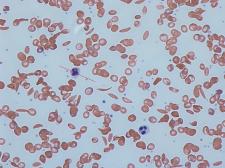Sickle cell disease and a pivotal moment to end health inequality
By Ted W. Love,
STAT
| 07. 15. 2021
Covid-19 laid bare the long-standing vulnerability of minority and low-income communities in U.S. society and its health system even as we celebrated the power of scientific innovation to rein in the pandemic. It’s time to turn that innovation, driven by an even greater mind shift, to end inequality in treatment.
In perhaps no condition is such inequality more evident than sickle cell disease — a genetic disease for which the molecular basis has been known since 1956 but for which innovative treatments have been elusive.
Beginning at birth, this disease deforms and destroys red blood cells. Instead of floating easily through the bloodstream as flattened disks, they contort into a rigid crescent or sickle shape. These sickle cells die off sooner than healthy red blood cells, causing anemia. They can also clump together and block blood vessels, causing pain (known as sickle cell crises or vaso-occlusive crises), organ failure, and early death. People with sickle cell disease die on average 30 years sooner than people without it.
The vast majority of those affected by sickle cell disease in the U.S...
Related Articles
By David Jensen, California Stem Cell Report | 02.10.2026
Touchy issues involving accusations that California’s $12 billion gene and stem cell research agency is pushing aside “good science” in favor of new priorities and preferences will be aired again in late March at a public meeting in Sacramento.
The...
By Alex Polyakov, The Conversation | 02.09.2026
Prospective parents are being marketed genetic tests that claim to predict which IVF embryo will grow into the tallest, smartest or healthiest child.
But these tests cannot deliver what they promise. The benefits are likely minimal, while the risks to...
By Mike McIntire, The New York Times | 01.24.2026
Genetic researchers were seeking children for an ambitious, federally funded project to track brain development — a study that they told families could yield invaluable discoveries about DNA’s impact on behavior and disease.
They also promised that the children’s sensitive...
By Arthur Lazarus, MedPage Today | 01.23.2026
A growing body of contemporary research and reporting exposes how old ideas can find new life when repurposed within modern systems of medicine, technology, and public policy. Over the last decade, several trends have converged:
- The rise of polygenic scoring...




